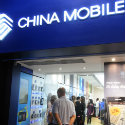
China Mobile is reported to have applied for a license to operate FDD LTE technology out of concern it could face a spectrum crunch in its TDD LTE bands.
The country's biggest mobile operator has so far relied exclusively on TDD technology to provide 4G services, and it claimed to have more than 106 million 4G customers earlier this year.
According to the C114.net website, however, the operator has just filed an application for an FDD license, arguing this will give it a 4G alternative if it starts to run out of available TDD spectrum.
China Mobile Ltd. (NYSE: CHL) has also said it plans on integrating FDD and LTE during networking trials and that other countries could learn from its experiences.
The aim may be to give a spur to the adoption of TDD systems, which could benefit China Mobile by lowering equipment costs.
Want to know more about 4G LTE? Check out our dedicated 4G LTE content channel here on Light Reading.
FDD technology uses one slot of spectrum for uplink communications and another for the downlink, while TDD relies on a single chunk for both.
Most operators have veered towards FDD for their 4G deployments, having used this system with 2G and 3G.
Indeed, both China Unicom Ltd. (NYSE: CHU) and China Telecom Corp. Ltd. (NYSE: CHA) -- China Mobile's smaller 4G rivals -- seem to prefer FDD. While they received TDD licenses in December 2013, at the same time as China Mobile, they have seemed reluctant to invest heavily in TDD technology. (See China Issues 4G TDD Licences.)
Having secured FDD licenses in February, both operators now have little excuse not to speed up the deployment of their 4G networks. China Unicom's ultimate aim is to cover 95% of the population with mobile broadband, while China Telecom hopes to be serving a total of 100 million 4G customers by the end of this year. (See China Issues LTE FDD Licenses .)
China Telecom was recently reported to have selected five vendors for the second phase of its LTE rollout, but the scope of the planned work remains unclear. (See China Telecom Names Five LTE FDD Suppliers and Nokia Sees Off Non-Chinese Rivals for China Telecom 4G Work.)
While catching up with China Mobile may prove impossible, China Unicom has insisted that reliance on a "hybrid" system will be "conducive to better development of the company's mobile broadband business."
Market research company Analysys Mason is in broad agreement, having previously argued that a hybrid network will give operators more flexibility and let them manage network resources more efficiently.
— Iain Morris, 

 , News Editor, Light Reading
, News Editor, Light Reading
Read more about:
AsiaAbout the Author(s)
You May Also Like











